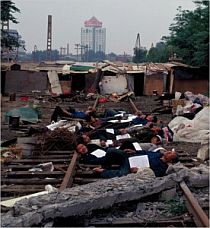


Chinese Films on Docalliance

It is a pleasure – again – to be able to promote the quality vod Docalliance. Not only is the selection of films for the catalogue excellent, the prices are very low and the texts are free from normal site publicity language, it conveys information and treats the reader with respect. Read this:
Some are enthusiastic about China, some are rather fearful; only a few ignore China; yet only a few know the real China of today. China is more than nationalism, economy and human rights though; China is primarily its people. These, however, are left in the background, under the cover of the official media image created by state propaganda and western media. It is the concrete people’s stories rather than the collective mass of a nation that are in the focus of the three Chinese directors and their films. Out of the three, London-based Chinese writer and director Xiaolu Guo is the closest to the West. Her books are translated into English; her fiction film She, a Chinese (both written and directed by her) won the Grand Prize at the 2009 Locarno festival. It was in the pauses during shooting of this film that her documentary film Once upon a Proletarian was made. According to the director’s words, the documentary mosaic of present-day post-Marxist China was inspired by the encounter with onlookers following the filmmakers‘ work. In twelve chapters, the life stories of the protagonists carefully selected across social classes unwind in a compressed yet expressive way. Not lacking poetry and humour either, the film ends by the symbolical wish of a young student of painting: “Life in freedom is a happy life!” As for other films by Xialu Guo available at
Docalliancefilms, you can also watch a mini collection of short films called 3 Short Films about Home.
100 Patients of Doctor Jia by filmmaker and theatre artist Wang Hongjun is conveyed in a similar spirit. The film is interesting for its form; consisting in a single shot, it gradually presents the 100 patients mentioned in its title. They are coming to a country doctor’s office with their worries, anxieties, ailments but also joys and humour. Though the simple concept might look boring, it works perfectly well, surprisingly as the film takes over an hour. Telling about the tough past of the Chinese countryside as well as about the current problems of its diverse society, between the lines the documentary challenges the official myth of China as a single compact nation.
Director Zhao Liang and his film Petition, screened at the Cannes festival, are in greatest discrepancy with the Chinese propaganda. As perhaps the most impressive of the mentioned films, the documentary examines nothing lesser than the very foundations of the contemporary political system of the country. Its protagonists are primarily poor inhabitants of the regions coming to Beijing to complain about the injustice they suffered from local authorities. However, the central government doesn’t treat them any better, with most of them getting stuck in a troublesome and literally Kafka-like situation in front of the gates of “the law”. Although they have been persecuted, bullied, forced to sleep under bridges and to live on junk during the twelve years of observational shooting, most of the protagonists refuse to give up their hopes for justice.
Still: Zhao Liang’s Petition. From Gdenerate Films.